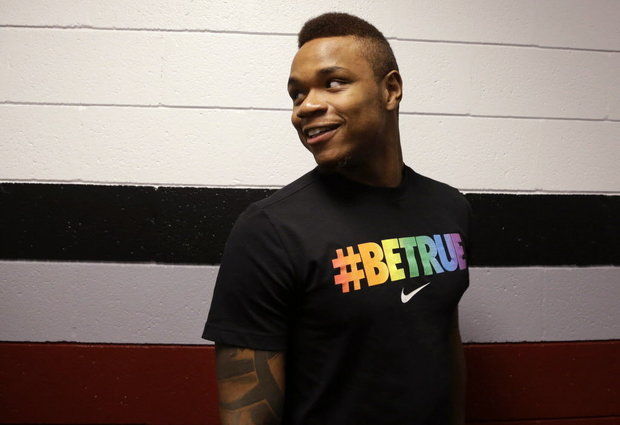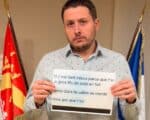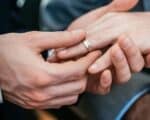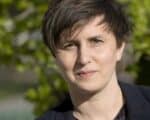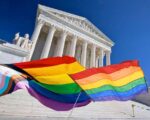>> After seeing ‘blatant homophobia’ during transfer, Derrick Gordon could face more challenges at Seton Hall
[spacer]
Le 9 avril dernier, le jeune homme de 23 ans révélait son homosexualité pour devenir le premier joueur ouvertement homosexuel à fouler les parquets de la NCAA, la prestigieuse ligue universitaire de basket.
« J’ai vécu toute ma vie comme un mensonge. Je raconte mon histoire afin que les athlètes ne pensent pas qu’ils soient obligés de se cacher. Vous pouvez être vous-même et progresser dans le sport qui vous passionne. Je veux donner aux jeunes un peu de courage et montrer l’exemple. ».
En couple avec l’acteur Gerald McCullouch (“Les Experts”), Derrick Gordon avait dernièrement annoncé son intention de quitter les rangs de l’Umass, dont il faisait partie, pour évoluer. Son poste d’arrière dans l’équipe ne lui correspondait plus. Mais, si la direction de l’université du Massachusetts le soutenait, à l’instar de Jason Collins, qui depuis ses révélations reste relativement écarté, Derrick a confié dans une interview sur USA Today que « pendant tout le processus de recrutement, plusieurs universités avaient refusé sa candidature parce qu’il était homosexuel. ».
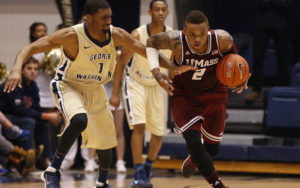 Considéré comme un « jeune prodige », Derrick a d’abord eu du mal à y croire :
Considéré comme un « jeune prodige », Derrick a d’abord eu du mal à y croire :
« La sexualité d’un athlète ne devrait pas être un quelconque moyen de juger la qualité de ses prestations sportives. C’est bien évidemment de l’homophobie… même si les entraineurs ne l’admettent pas spécifiquement ! Mais, je ne peux pas non plus les obliger à me recruter. Ils pensent peut-être que je vais distraire l’équipe… Je suis comme je suis, ouvertement homosexuel, mais je suis surtout un excellent joueur. Et je sais également de quoi je suis capable sur un terrain ! ».
Derrick Gordon a finalement assuré son transfert, pour intégrer le campus de Seton Hall, dans le New Jersey.
Terrence Katchadourian
@stop_homophobie
[spacer]
>> Derrick Gordon has a new home at Seton Hall after electing to transfer for his final season of eligibility. But it’s the potential landing spots the former University of Massachusetts guard didn’t end up at that have made waves.
Without naming names, Gordon told the USA TODAY Sunday that while he was in the process of being recruiting as a transfer target, « a number of schools didn’t want me because I’m gay. »
« To me, that’s blatant homophobia, » said Gordon, who in April 2014 came out as the first openly gay player in Division I men’s basketball history.
« During the recruiting process, a number of schools didn’t want me because I’m gay. To me, that’s blatant homophobia, » Gordon told USA TODAY. « At the end of the day, no coaches will ever admit that they don’t want me because I’m gay and there’s baggage that comes with the attention.
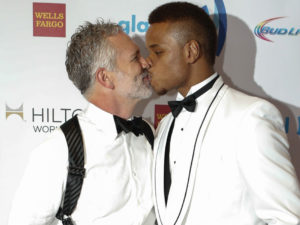 After making his decision to transfer in March, Gordon discussed his rationale, explaining how he had grown unhappy with on-court role at UMass and had hoped to impress NBA scouts by taking on a larger role with a new school.
After making his decision to transfer in March, Gordon discussed his rationale, explaining how he had grown unhappy with on-court role at UMass and had hoped to impress NBA scouts by taking on a larger role with a new school.
Transferring had nothing to do with his sexuality, he said, but Gordon suspected that being openly gay might still be an issue as he sought out the right location to complete his career.
« Some coaches may think that bringing me in will be a distraction, » Gordon told MassLive.com. « Do I think it will play a part as far was whether coaches recruit me or not? Maybe it will, I don’t know. I can’t make a coach want to recruit me. I am who I am. I know I’m opening gay, but I’m a hell of a player and I know what I’m capable of doing on the court. »
Despite that appraisal of the situation, Gordon told the USA TODAY that his experience during recruitment « caught me off-guard. »
« It really hurt. It had me stressing, crying, » he said. « I was starting to lose hope. I felt like I was being treated like an outsider, like I didn’t belong in the NCAA. I couldn’t believe it because I’m a good player and they were looking at the opposite — something that doesn’t mean anything with my (sexuality). … Nah, not the gay guy. »


